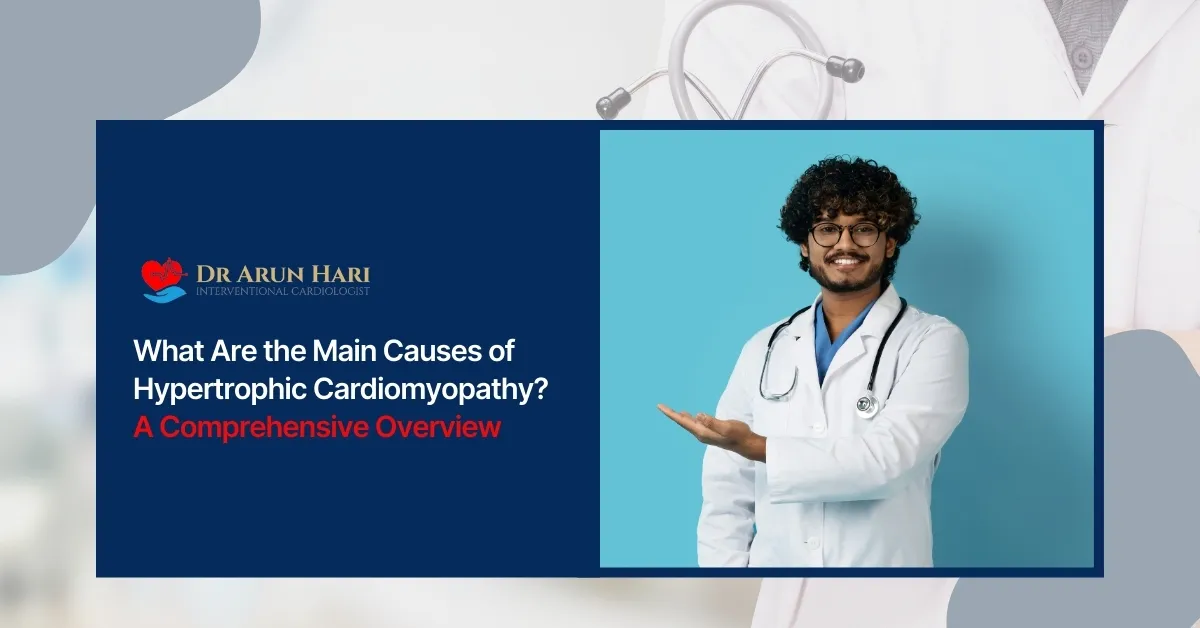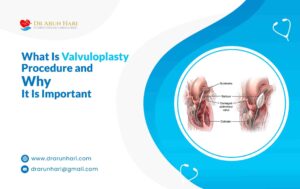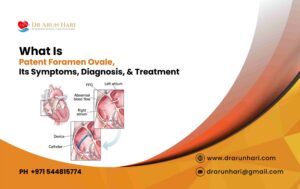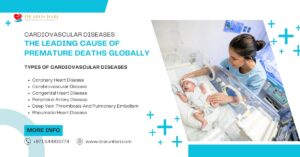Identifying the Causes of Hypertrophic Cardiomyopathy
Hypertrophic Cardiomyopathy (HCM) happens to be a condition, which tends to affect the heart muscle, resulting in it to become abnormally thickened. In Abu Dhabi (UAE), an estimated one in 500 individuals tend to suffer from Hypertrophic Cardiomyopathy, though awareness about this condition is still relatively low. Understanding the causes of Hypertrophic Cardiomyopathy, HCM diagnosis, & treatment options is crucial for individuals who may be at risk. As the HCM population grows, its early diagnosis & management tend to be quite essential in preventing serious health complications.
What is Hypertrophic Cardiomyopathy?
Hypertrophic Cardiomyopathy happens to be a genetic disorder that’s characterised by the abnormal thickening of the heart muscle, especially affecting the left ventricle thickening. Such thickening can impede blood flow, making it hard for the heart to pump blood effectively. HCM can occur in various forms, including Hypertrophic Obstructive Cardiomyopathy (HOCM), where the thickened muscle obstructs the flow of blood. Although HCM may be present from birth, symptoms usually don’t appear until later in life. In some cases, patients with familial Hypertrophic Cardiomyopathy may experience severe complications if not treated timely. Such a condition is mainly caused by genetic mutations, which affect the proteins involved in muscle contraction in the heart. The most common symptoms of Hypertrophic Cardiomyopathy tend to include shortness of breath, chest pain, dizziness, & even fainting. Without treatment, HCM can result in serious issues like arrhythmias, heart failure, & even sudden cardiac death.
Causes & Mechanism of Hypertrophic Cardiomyopathy
The causes of Hypertrophic Cardiomyopathy are mainly genetic in nature. HCM genetics suggest that this condition is usually inherited through an Autosomal Dominant Inheritance pattern, which means that a single copy of the mutated gene from either parent is enough to cause such a condition. In familial Hypertrophic Cardiomyopathy, multiple family members might be affected, making it crucial to undergo genetic counselling & genetic testing for HCM if there is a family history of this heart disease. At the molecular level, the condition arises from mutations in genes, which encode for the proteins of the cardiac muscle fibres, like myosin-binding protein C & cardiac myosin heavy chain. Such mutations cause the heart muscle cells to grow abnormally, resulting in heart muscle thickening. The thickening most commonly affects the left ventricle, which is responsible for pumping oxygenated blood to the body. As a result, left ventricle thickening reduces the chamber size. This results in increased pressure. It can cause a blockage of the outflow tract, further affecting the heart’s ability to pump efficiently.
What Are the Main Causes of Hypertrophic Cardiomyopathy? A Comprehensive Overview
The primary causes of Hypertrophic Cardiomyopathy tend to include genetic mutations., which impact the structural components of the heart muscle. Here is a more detailed breakdown of how these causes result in HCM development:
- Genetic Mutations: The most common cause of Hypertrophic Cardiomyopathy is mutations in genes that are responsible for producing the proteins of the heart muscle. Such mutations can cause the heart muscle to grow abnormally thick.
- Autosomal Dominant Inheritance: HCM follows an Autosomal Dominant Inheritance pattern, which means that if one parent carries the mutated gene, there is a fifty percent chance of passing it on to the children.
- Family History of HCM: If multiple family members are affected by HCM, the risk of inheriting this condition is much higher, especially in familial Hypertrophic Cardiomyopathy cases.
Key Factors of Hypertrophic Cardiomyopathy
- HCM Genetics: The genetic mutations responsible for Hypertrophic Cardiomyopathy most often affect proteins, which are involved in the muscle’s contraction & relaxation, like myosin-binding protein C & cardiac myosin heavy chain.
- Heart Muscle Thickening: The condition results in heart muscle thickening, especially in the left ventricle. This results in reduced space for blood flow & can cause complications such as arrhythmias & heart failure.
- Hypertrophic Cardiomyopathy Symptoms: The common Hypertrophic Cardiomyopathy symptoms include shortness of breath, dizziness, fatigue, fainting (syncope), & chest pain. Such symptoms occur because of the heart’s reduced ability to pump blood & the augmented stress on the heart muscle.
- Left Ventricle Thickening: Left ventricle thickening is one of the most prominent signs of Hypertrophic Cardiomyopathy. It restricts the blood flow from the heart, leading to heart strain & potential obstruction.
- HCM Diagnosis: Diagnosing HCM involves a combination of physical exams, family history assessment, & imaging tests such as echocardiograms or MRIs. Genetic testing for HCM can also help confirm the diagnosis & detect family members who may be at risk.
HCM Risk Factors
HCM risk factors tend to include family history, genetic mutations, & certain medical conditions, which may exacerbate the condition. Some patients might develop Hypertrophic Obstructive Cardiomyopathy (HOCM), where the thickened heart muscle blocks the outflow of blood from the left ventricle, resulting in more severe symptoms. Other contributing factors tend to include high BP, specifically when it is untreated for long periods, and certain environmental factors such as physical stress or athletic training in people with a genetic predisposition.
HCM Diagnosis
HCM diagnosis is critical for timely intervention. In addition to genetic testing, imaging studies like echocardiograms, MRI scans, & EKGs help to visualise the heart’s structure & function, determining the degree of heart muscle thickening. Blood tests & family history assessments also play a crucial role in the diagnosis of HCM.
Hypertrophic Obstructive Cardiomyopathy & Familial Hypertrophic Cardiomyopathy
Hypertrophic Obstructive Cardiomyopathy (HOCM) is a type of Hypertrophic Cardiomyopathy, which tends to occur when the thickened heart muscle blocks the normal flow of blood from the left ventricle. Such an obstruction can result in chest pain, fainting, & in severe cases, heart failure or sudden cardiac death. Patients with HOCM need close monitoring. They may be candidates for surgical treatments such as septal myectomy or alcohol septal ablation to remove the obstructed muscle tissue. Familial Hypertrophic Cardiomyopathy refers to the inheritance of HCM within families. It is crucial for individuals with a family history of Hypertrophic Cardiomyopathy to undergo genetic counselling & screening for early detection. Genetic testing for HCM is usually recommended for identifying asymptomatic individuals who carry the genetic mutation but haven’t yet developed symptoms.
Understanding the Treatment Options for Hypertrophic Cardiomyopathy
The treatment for Hypertrophic Cardiomyopathy focuses on alleviating symptoms & preventing complications. While there is no cure for HCM, several therapies can help manage this condition:
- Medicines: Beta-blockers & calcium channel blockers are usually prescribed to control symptoms & to manage abnormal heart rhythms.
- Surgical Options: In severe cases, surgery might be needed. Septal myectomy tends to involve removing part of the thickened heart muscle to improve blood flow, while alcohol septal ablation uses alcohol to destroy part of the muscle.
- Lifestyle Adjustments: Patients are advised to avoid intense physical exertion, as it can exacerbate symptoms.
Contact Doctor Arun Hari for Hypertrophic Cardiomyopathy Treatment
You gathered good information about the causes of Hypertrophic Cardiomyopathy! So, if you are experiencing symptoms of Hypertrophic Cardiomyopathy or have a family history of familial Hypertrophic Cardiomyopathy, it is important to consult with an experienced cardiologist. Doctor Hari happens to be a leading cardiologist at LLH Hospital in Abu Dhabi, UAE. He specialises in its diagnosis & Hypertrophic Cardiomyopathy treatment. His expertise in managing HCM ascertains that patients get the highest standard of care for this complex condition. Visit Doctor Arun for more information on HCM diagnosis & treatment options and schedule a consultation to take the 1st step toward managing Hypertrophic Cardiomyopathy efficiently.





